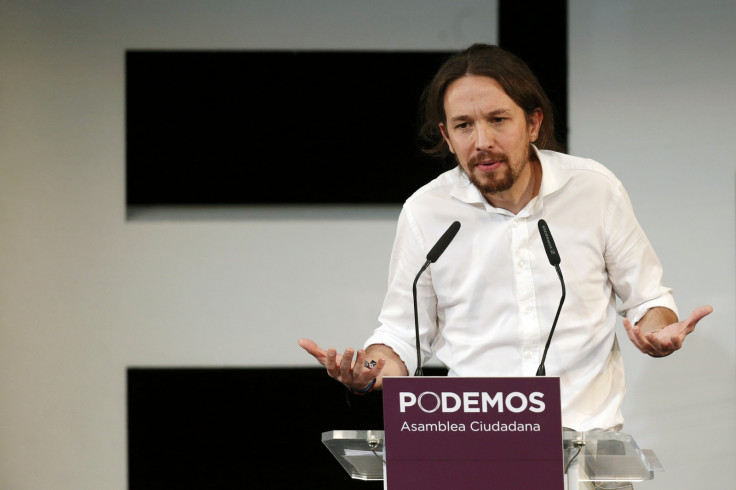The Spanish Ukip: How Podemos Leader Pablo Iglesias is 'Doing a Nigel Farage' in Iberia

There are many who never believed Pablo Iglesias, the professor who usually appears on TV talk shows or the "Ponytail Man" who buys his clothes in Alcampo (a famous Spanish supermarket) could go far. But the truth is that, in a short time, his party has achieved more in just a few months than fellow left-wing party Izquierda Unida has achieved over several years.
Only two months after being registered, Podemos got five European Parliament seats in the elections held in May. The last public opinion survey carried out by the CIS has revealed Podemos is the leading political party in Spain in terms of direct vote (17.5%) and the third-biggest according to the estimated vote.
In a way, the rise of Podemos is analogous to the ascent of Ukip in the UK. The core messages of the two parties are so different as to be diametrically opposed; yet there are clear similarities in the way that Iglesias and Ukip leader Nigel Farage have channeled their unorthodox charisma into public support.
Both have styled themselves as anti-establishment mavericks who have ridden to the rescue of the masses and want nothing more than an end to the stultifying political monopolies in their respective countries.
Revolutionary atmosphere inspires Podemos
The phenomenon of Podemos (which translates from Spanish as "We Can") was born as a channel to keep alive the energy of the 15-M, or the "indignados" movement, which gained ground in May 2011 after the Spanish society decided to raise its voice in protest at the austerity measures taken by a government whose main objective was to save banks with public money.
Amid this revolutionary atmosphere, the Platform of Those Affected by Mortgages (PAH) has played an important role to stop evictions and its slogan, "Sí, se puede" (Yes, it can be done) seems to be the inspiration of Podemos. Even its organisational structure, based on "circles" in which citizens have an active role to make decisions, reminds one of the famous "assemblies" in the 15-M movement.
At the apex of this structure, Iglesias has provided a breath of fresh air to a political scene stained by corruption. Since the beginning, he has highlighted his intentions to tackle PPSOE, a portmanteau that describes Spain's two-party system.
Podemos has also emphasised its aim to govern for "ordinary people" - the party has strived to adopt a style and behaviour totally different to "the caste", Iglesias' derogatory term of the political members and institutions he believes are weakening the democracy. To this end, the party decided to donate part of its salary to prevent people from being evicted, as well as traveling in economy class to reduce costs.
This was a good way to show this party remains near the real world and consequently a powerful tool to attract supporters. But Iglesias' prowess as a public speaker has also undoubtedly engaged people. Like it or not, he has proven to have strong communication abilities in different languages together with an excellent academic background, like the rest of his team.

Undoubtedly, Podemos has arrived at the right moment and its success is clearly an indictment of Spain's disenchanted, hopeless society, together with the disastrous management by the government. Iglesias brings together the votes of those unsatisfied with the traditional left-wing parties and the people disappointed by the bipartisan political system.
However, this combination of circumstances has led to obvious claims that Podemos is comprised of cynical opportunists with no political depth. Furthermore, there are several other detractor factors that Podemos has to face.
On the one hand, Iglesias defends radical ideas that are considered dangerous by some. He has shown a liking for Hugo Chavez on several occasions, affirming that he "envies" the former leader of Venezuela's regime, and it has emerged that he was even involved in the Communist party as a youth (however we should also remember Aznar, the former president of the right-wing party Partido Popular, has a past connected with the Falangist Youth).
On the other hand, Iglesias is in favour of freedom for ETA terrorists, which drove Esperanza Aguirre (the former PP president of Madrid Region) to accuse him of being pro-ETA and supporting Chavism.
Does Podemos have concrete proposals to implement?
Aside from this radical tinge, Podemos has always been criticised for not presenting a solid programme with viable measures. Instead it is said that he only says what people want to hear (a barb which has also been hurled at Farage from various quarters).
Although Iglesias seems to be self-confident, having previously stated he would resign if he won the election and was not able to accomplish his promises, his image has recently been damaged.
When about his radical leanings and perceived lack of concrete policies by the journalist Ana Pastor, Iglesias did not provide firm answers. So, it is suspicious that days later, Iglesias refused to be interviewed by Tele5, as the channel did not accept the specific conditions he demanded. Perhaps he was afraid of suffering another public ambush.
But even with these setbacks, Iglesias' popularity is increasing. Perversely, his opponents appear to be abetting this rise by giving Podemos prominence every time they try to drag them down, instead of worrying about their own parties.
Indeed, it seems Podemos is following the saying "what doesn't kill you make you stronger", judging by its slogan "Su odio, nuestra sonrisa" (their hate, our smile).
Nevertheless, it is still soon to predict whether this smile will remain and Podemos can translate its current popularity into genuine success at the next elections. Time will tell whether Podemos turns out to be an opportunist snake charmer or the hero everyone expects.
Maria del Carmen Alcaide Nortes is a Spanish jounalist, translator and interpreter who has worked for several outlets including ESM magazine and regional radio chain Onda Cero.
© Copyright IBTimes 2025. All rights reserved.





















